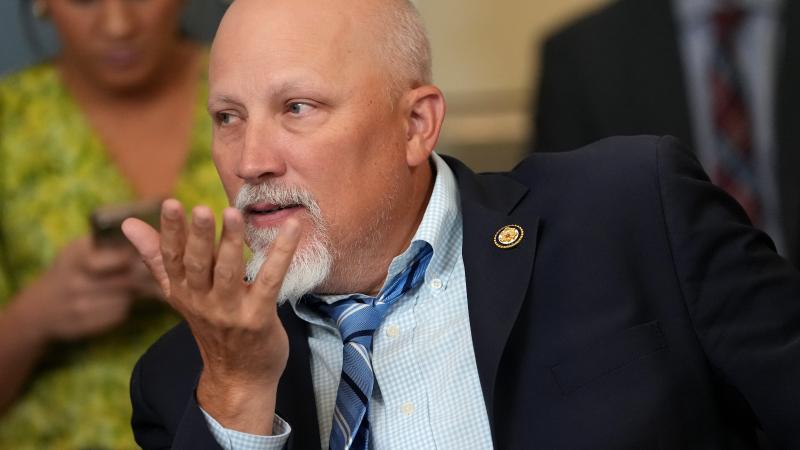Congressional Dems ponder legislative pivot as election overhaul bill gasps for air
The Democratic caucus is maintaining a (mostly) united front, but behind the scenes some are wondering if a less sweeping bill is the one to bet on.
Democrats in the Senate are facing the fact that their sweeping election overhaul bill, S.1 (the "For the People Act"), will likely die in the upper chamber.
Caucus leaders are beginning to contemplate pivoting to a vehicle with broader appeal, the John Lewis Voting Rights Advancement Act, a beefed-up version of the Voting Rights Act of 1965 that would restore and extend mandatory oversight from the Department of Justice over election procedures in jurisdictions deemed to have histories of prejudicial voting laws.
Though Senate Majority Leader Chuck Schumer and House Speaker Nancy Pelosi have repeatedly emphasized the importance of passing H.R. 1/S. 1, the Senate bill is currently stuck in a partisan deadlock in committee with no clear path toward passage.
Last week, Democrats met to brainstorm how to move forward, but no conclusion was reached, and some Democrats — including Sen. Joe Manchin of West Virginia, a key swing vote in the 50-50 Senate — declined to participate in the conversation at all. Manchin and Sen. Kyrsten Sinema of Arizona, moreover, remain opposed to overturning the legislative filibuster, which would be necessary for Democrats to pass S. 1 without Republican support.
S. 1 is "too darn broad, and we got no bipartisan support," Manchin said last week.
"The country is more divided than it's ever been," he continued, explaining that he doesn't want to worsen the divisions by forcing through more legislation that has zero bipartisan appeal.
Even Democrats to the left of Manchin are signaling that S. 1 may not be worth a fight that will likely end in defeat.
"We've got a lot of different opinions in the caucus, and I think there's a general consensus that we have to move forward on democracy reforms," said Connecticut Sen. Chris Murphy. "But it's going to take us, you know, a little while to get everybody on the same page."
It is that imperative to find an election reform vehicle that can unify the party that has some in the caucus eyeing the John Lewis Voting Rights Act — which Manchin has said he will support — as a pragmatic alternative.
On Monday, Manchin and moderate Republican Sen. Lisa Murkowski of Alaska sent a letter to the leaders of Congress encouraging the reauthorization of the Voting Rights Act of 1965 (i.e., the John Lewis bill). The letter signals centrist support for voting reform in a form more modest than S. 1. — but that might not be enough for some Democrats.
Murphy cautioned that the John Lewis bill, which has not yet been filed in this Congress (a version — H.R. 4 — was introduced in December of 2019), does not go far enough.
"We've gotta go broader than the John Lewis bill," Murphy said.
Pragmatically, some Democrats fear that failure to deliver on S. 1 will mean disaster in 2022 for more reasons than one. Oregon Sen. Jeff Merkley, a progressive, says that giving up on the transformative election reform package will signal weakness to the base.
"We'll lose massively because we're burned out by failure to deliver, and we'll lose massively because of new voting restrictions," Merkley said. "Our grassroots is going to be so discouraged if we fail to get this passed."
A recent analysis by the Brennan Center for Justice at NYU's School of Law found that H.R. 1 is the single highest priority for progressive voters, who believe it will counter the wave of election integrity reforms adopted by GOP-majority legislatures across the country.
"The John Lewis Voting Rights Advancement Act builds for us the fire station to protect us against future fires," said freshman Democratic Sen. Raphael Warnock of Georgia. "But the house of democracy, as a result of voter suppression bills all across the country, is on fire right now."
Republicans vehemently reject H.R. 1/S.1 as a gratuitous solution to a non-existent problem. They have labeled the bill a power grab by Washington Democrats intent on federalizing elections to make it extremely difficult for the party out of power to regain control.
"This is a manufactured problem, making every Republican a racist, and it ain't working," South Carolina Sen. Lindsey Graham told the Washington Post.
Many black conservatives have stepped forward to denounce the racial condescension implied in Democrat efforts to stigmatize voter ID requirements as "voter suppression" tactics targeting blacks.
"Somehow we're not smart enough to get an ID, and therefore requiring one is racist," famed civil rights activist Bob Woodson said on a recent episode of the John Solomon Reports podcast. "When you begin to apply all these exemptions from the standards that everyone else has to confirm to, it's almost as if black America is being treated like an exotic pet."
Schumer has promised to bring S. 1 to the floor for a vote by August, giving him about two months to come up with a viable strategy to overcome the significant obstacles currently impeding passage of the bill. The House Judiciary Committee is gearing up for hearings that will lead to the reintroduction of the John Lewis Voting Rights Act later this summer.
Republicans, meanwhile, hope that holdouts remain holdouts.
"We hope that Sen. Manchin will remain true to his recent public statements and not cave on the filibuster, which means S. 1 will be dead on arrival," said Garrett Bess, vice president of government relations and communications at conservative Heritage Action.
"But the left has numerous backup plans," he cautioned, including H.R. 4, "which essentially leaves local election-related decisions, such as redistricting, in the hands of Washington bureaucrats."














